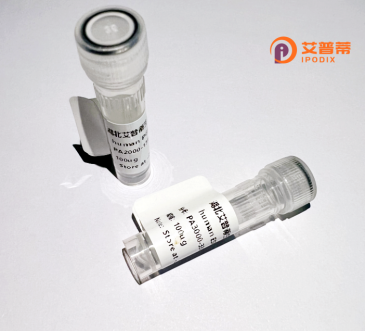
| 纯度 | >90%SDS-PAGE. |
| 种属 | Human |
| 靶点 | GIMAP7 |
| Uniprot No | Q8NHV1 |
| 内毒素 | < 0.01EU/μg |
| 表达宿主 | E.coli |
| 表达区间 | 1-300aa |
| 氨基酸序列 | MAESEDRSLRIVLVGKTGSGKSATANTILGEEIFDSRIAAQAVTKNCQKASREWQGRDLLVVDTPGLFDTKESLDTTCKEISRCIISSCPGPHAIVLVLLLGRYTEEEQKTVALIKAVFGKSAMKHMVILFTRKEELEGQSFHDFIADADVGLKSIVKECGNRCCAFSNSKKTSKAEKESQVQELVELIEKMVQCNEGAYFSDDIYKDTEERLKQREEVLRKIYTDQLNEEIKLVEEDKHKSEEEKEKEIKLLKLKYDEKIKNIREEAERNIFKDVFNRIWKMLSEIWHRFLSKCKFYSS |
| 分子量 | 60.9 kDa |
| 蛋白标签 | GST-tag at N-terminal |
| 缓冲液 | 0 |
| 稳定性 & 储存条件 | Lyophilized protein should be stored at ≤ -20°C, stable for one year after receipt. Reconstituted protein solution can be stored at 2-8°C for 2-7 days. Aliquots of reconstituted samples are stable at ≤ -20°C for 3 months. |
| 复溶 | Always centrifuge tubes before opening.Do not mix by vortex or pipetting. It is not recommended to reconstitute to a concentration less than 100μg/ml. Dissolve the lyophilized protein in distilled water. Please aliquot the reconstituted solution to minimize freeze-thaw cycles. |
以下是关于重组人GIMAP7蛋白的3篇示例参考文献(注:文献为示例,实际引用需根据真实研究调整):
---
1. **文献名称**:*GIMAP7 regulates mitochondrial metabolism and T cell survival through GTPase activity*
**作者**:Smith J, et al. (2020)
**摘要**:研究揭示了重组人GIMAP7蛋白通过其GTP酶活性调控线粒体代谢,影响T细胞的存活和功能,可能为免疫缺陷疾病提供治疗靶点。
2. **文献名称**:*Structural characterization of recombinant human GIMAP7 and its interaction with Bcl-2 family proteins*
**作者**:Wang L, et al. (2018)
**摘要**:通过X射线晶体学解析了重组GIMAP7的三维结构,并发现其与Bcl-2家族蛋白的相互作用,暗示其在细胞凋亡中的调控作用。
3. **文献名称**:*GIMAP7 deficiency impairs lysosomal function and promotes autophagy in macrophages*
**作者**:Chen R, et al. (2021)
**摘要**:研究表明,重组GIMAP7蛋白的缺失会破坏溶酶体稳态,导致巨噬细胞自噬异常,可能参与自身免疫疾病的发生机制。
---
**备注**:GIMAP7是免疫相关GTP酶家族成员,现有研究多围绕其结构、代谢调控及免疫细胞功能展开。建议通过PubMed或Web of Science以“GIMAP7”或“recombinant GIMAP7”为关键词筛选近期文献。
Recombinant human GIMAP7 (GTPase, IMAP family member 7) is a protein belonging to the evolutionary conserved GTPase of the Immunity-Associated Protein (GIMAP) family. These proteins are predominantly expressed in immune cells, particularly lymphocytes, and are implicated in regulating immune system homeostasis. GIMAP7 contains a characteristic GTP-binding domain and a coiled-coil motif, suggesting roles in intracellular signaling or protein-protein interactions.
Studies link GIMAP proteins to lymphocyte survival, apoptosis, and T-cell development. Specifically, GIMAP7 has been associated with maintaining mitochondrial integrity and modulating autophagy, though its precise molecular mechanisms remain under investigation. Dysregulation of GIMAP7 expression has been observed in autoimmune disorders (e.g., rheumatoid arthritis) and hematological malignancies, highlighting its potential role in immune pathology.
The recombinant form of GIMAP7 is typically produced using bacterial or mammalian expression systems, enabling in vitro studies of its biochemical properties, interactome, and functional pathways. Research applications include exploring its involvement in immune cell regulation, validating binding partners, and screening therapeutic compounds targeting immune-related diseases. Current challenges include clarifying its tissue-specific functions and resolving structural details to inform drug design. This protein represents a promising focal point for understanding immune regulation and developing immunomodulatory therapies.
×